Related Research Articles

Gioachino Antonio Rossini was an Italian composer who gained fame for his 39 operas, although he also wrote many songs, some chamber music and piano pieces and some sacred music. He set new standards for both comic and serious opera before retiring from large-scale composition while still in his thirties, at the height of his popularity.

Giuseppe Fortunino Francesco Verdi was an Italian composer best known for his operas. He was born near Busseto, a small town in the province of Parma, to a family of moderate means, receiving a musical education with the help of a local patron, Antonio Barezzi. Verdi came to dominate the Italian opera scene after the era of Gioachino Rossini, Vincenzo Bellini, and Gaetano Donizetti, whose works significantly influenced him.

La traviata is an opera in three acts by Giuseppe Verdi set to an Italian libretto by Francesco Maria Piave. It is based on La Dame aux camélias (1852), a play by Alexandre Dumas fils, which he adapted from his own 1848 novel. The opera was originally titled Violetta, after the main character. It was first performed on 6 March 1853 at La Fenice opera house in Venice.

The unification of Italy, also known as the Risorgimento, was the 19th century political and social movement that in 1861 resulted in the consolidation of various states of the Italian Peninsula and its outlying isles into a single state, the Kingdom of Italy. Inspired by the rebellions in the 1820s and 1830s against the outcome of the Congress of Vienna, the unification process was precipitated by the Revolutions of 1848, and reached completion in 1871 after the capture of Rome and its designation as the capital of the Kingdom of Italy.
A virtuoso is an individual who possesses outstanding talent and technical ability in a particular art or field such as fine arts, music, singing, playing a musical instrument, or composition.

Carl Dahlhaus was a German musicologist who was among the leading postwar musicologists of the mid to late 20th-century. A prolific scholar, he had broad interests though his research focused on 19th- and 20th-century classical music, both areas in which he made significant advancements. However, he remains best known in the English-speaking world for his writings on Wagner. Dahlhaus wrote on many other composers, including Josquin, Gesualdo, Bach and Schoenberg.
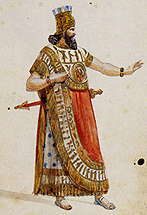
Nabucco is an Italian-language opera in four acts composed in 1841 by Giuseppe Verdi to an Italian libretto by Temistocle Solera. The libretto is based on the biblical books of 2 Kings, Jeremiah, Lamentations, and Daniel, and on the 1836 play by Auguste Anicet-Bourgeois and Francis Cornu. However, Antonio Cortese's ballet adaptation of the play, given at La Scala in 1836, was a more important source for Solera than the play itself. Under its original name of Nabucodonosor, the opera was first performed at La Scala in Milan on 9 March 1842.

Grand opera is a genre of 19th-century opera generally in four or five acts, characterized by large-scale casts and orchestras. The original productions consisted of spectacular design and stage effects with plots normally based on or around dramatic historic events. The term is particularly applied to certain productions of the Paris Opéra from the late 1820s to around 1860; 'grand opéra' has sometimes been used to denote the Paris Opéra itself.
The "Anvil Chorus" is the English name for the Coro di Zingari, a chorus from act 2, scene 1 of Giuseppe Verdi's 1853 opera Il trovatore. It depicts Spanish Gypsies striking their anvils at dawn – hence its English name – and singing the praises of hard work, good wine, and Gypsy women. The piece is also commonly known by its opening words, "Vedi! Le fosche".
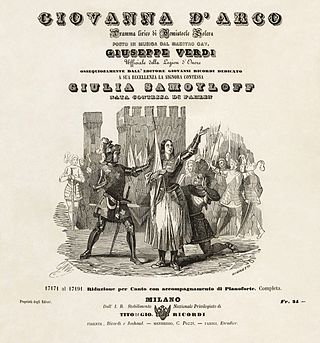
Giovanna d'Arco is an operatic dramma lirico with a prologue and three acts by Giuseppe Verdi set to an Italian libretto by Temistocle Solera, who had prepared the libretti for Nabucco and I Lombardi. It is Verdi's seventh opera.
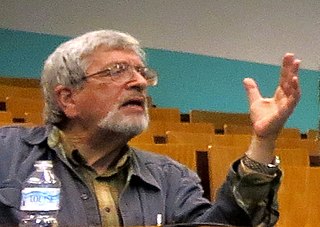
Richard Filler Taruskin was an American musicologist and music critic who was among the leading and most prominent music historians of his generation. The breadth of his scrutiny into source material as well as musical analysis that combines sociological, cultural, and political perspectives has incited much discussion, debate and controversy. He regularly wrote music criticism for newspapers including The New York Times. He researched a wide variety of areas, but a central topic was Russian music from the 18th century to the present day. Other subjects he engaged with include the theory of performance, 15th-century music, 20th-century classical music, nationalism in music, the theory of modernism, and analysis. He is best known for his monumental survey of Western classical music, the six-volume Oxford History of Western Music. His awards include the first Noah Greenberg Award from the American Musicological Society in 1978 and the Kyoto Prize in Arts and Philosophy in 2017.
Douglas Allanbrook was an American composer, concert pianist and harpsichordist. He was associated with a group of mid-twentieth century Boston composers who were students of Nadia Boulanger. His compositions are described by the Kennedy Center as "smooth, showing astute sense, assertiveness, and originality."

Jérusalem is a grand opera in four acts by Giuseppe Verdi. The libretto was to be an adaptation and partial translation of the composer's original 1843 Italian opera, I Lombardi alla prima crociata. It was the one opera which he regarded as the most suitable for being translated into French and, taking Eugène Scribe's advice, Verdi agreed that a French libretto was to be prepared by Alphonse Royer and Gustave Vaëz, who had written the libretto for Donizetti's most successful French opera, La favorite. The opera received its premiere performance at the Salle Le Peletier in Paris on 26 November 1847. The maiden production was designed by Paul Lormier (costumes), Charles Séchan, Jules Diéterle and Édouard Desplechin, and Charles-Antoine Cambon and Joseph Thierry.
Roger Parker is an English musicologist who was previously Thurston Dart Professor of Music at King's College London. His work has centred on opera. Between 2006 and 2010, while Professor of Music at Gresham College, London, Parker presented four series of free public lectures, one example being "Verdi and Milan" in 2007 which is available on video.
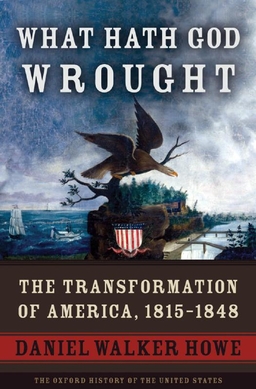
What Hath God Wrought: The Transformation of America, 1815–1848 is a nonfiction book about the history of the United States written by historian Daniel Walker Howe. Published in 2007 as part of the Oxford History of the United States series, the book offers a synthesis history of the early-nineteenth-century United States in a braided narrative that interweaves accounts of national politics, new communication technologies, emergent religions, and mass reform movements. The winner of multiple book prizes, including the 2008 Pulitzer Prize for History, reviewers widely praised What Hath God Wrought. Historian Richard Carwardine said it "lays powerful claim to being the best work ever written on this period of the American past."
Wye Jamison "Wendy" Allanbrook was an American musicologist whose writings demonstrated that much of the music of Mozart and his contemporaries was influenced by the social dances of the time.
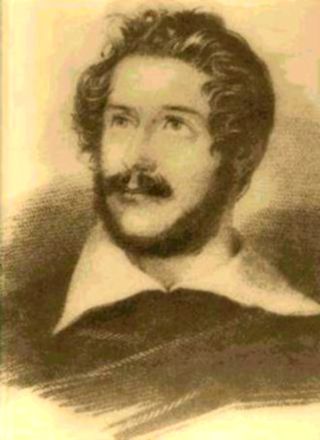
Count Carlo Pepoli was an Italian politician and journalist. He was also acclaimed as a poet, his most well-known work being the libretto for Vincenzo Bellini's final opera, I puritani which was given its premiere in Paris in January 1835.
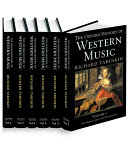
The Oxford History of Western Music is a narrative history from the "earliest notations" to the late twentieth century. It was written by the American musicologist Richard Taruskin. Published by Oxford University Press in 2005, it is a six-volume work on the various significant periods of Western music and their characteristic qualities, events and composition styles. A paperback edition in five volumes followed in 2009. Oxford University Press had previously published narrative histories of music, although Taruskin's was the first sole author work, spanning over 4000 pages.
Nicholas Baragwanath is a British music theorist, musicologist and pianist. He is currently Professor of Music at the University of Nottingham. He is best known for his contributions to the compositional theory and practice of 19th-century Italian Opera. He regularly writes and presents for BBC Radio 3.
References
- ↑ "Mary Ann Smart". Department of Italian Studies, University of California, Berkeley. Retrieved 1 February 2022.
- ↑ "Mary Ann Smart". Department of Music, University of California, Berkeley. Retrieved 1 February 2022.
- ↑ Reviews include:
- Carini, Jaime (December 2020). "Waiting for Verdi: Opera and Political Opinion in Nineteenth-Century Italy, 1815–1848 by Mary Ann Smart (review)". Notes. 77 (2): 291–294. doi:10.1353/not.2020.0105. S2CID 227256882.
- Grab, Alexander (December 2019). "Waiting for Verdi: Opera and Political Opinion in Nineteenth-Century Italy, 1815–1848 By Mary Ann Smart. Berkeley: University of California Press, 2018. Pp. xvi+236. $60.00". The Journal of Modern History. 91 (4): 953–955. doi:10.1086/705862. S2CID 210476899.
- Rutherford, Susan (2020). "Waiting for Verdi: opera and political opinion in nineteenth-century Italy, 1815–1848 by Mary Ann Smart, Oakland, University of California Press, 2018, xiv + 236 pp., $60.00 (hard cover), ISBN: 9780520276253". Journal of Modern Italian Studies. 25 (3): 347–359. doi:10.1080/1354571X.2020.1754667. S2CID 221055663.
- Madigan, Patrick (May 2020). "Waiting for Verdi: Opera and Political Opinion in Nineteenth-Century Italy, 1815-1848. By Smart, Mary Ann. Pp. xiv, 236, Oakland: University of California Press, 2018, $49.95". The Heythrop Journal. 61 (3): 566–567. doi:10.1111/heyj.13540. S2CID 219022457.
- Maes, Francis (2019). "Mary Ann Smart, Waiting for Verdi: Opera and Political Opinion in Nineteenth-Century Italy, 1815–1848". European History Quarterly. 49 (3): 533–534. doi:10.1177/0265691419860743v. S2CID 199151672.
- ↑ Chapin, Keith (February 2016). "The Secular Commedia: Comic Mimesis in Late Eighteenth-Century Music. By Wye Jamison Allanbrook . Ed. by Mary Ann Smart and Richard Taruskin . pp. xv + 234 . University of California Press , Oakland , 2014 . £41.95. ISBN 978-0-520-27407-5 ". Music and Letters. 97 (1): 165–167. doi:10.1093/ml/gcv111. Republished at Project MUSE
- ↑ Reviews include:
- Cruz, Gabriela (10 September 2007). "How Musical Is Gesture? Review of Mary Ann Smart. 2004. Mimomania: Music and Gesture in Nineteenth-Century Opera. Berkeley and Los Angeles: University of California Press". Current Musicology. 84. doi:10.7916/cm.v0i84.5102. Alternate URL
- Hibberd, Sarah (May 2007). "Mimomania: Music and Gesture in Nineteenth-Century Opera. By Mary Ann Smart . pp. ix + 247 . ( University of California Press , Berkeley, Los Angeles, and London , 2004 , £45. ISBN 0- 520-23995-4.)". Music and Letters. 88 (2): 370–374. doi:10.1093/ml/gcl148.
- Campana, Alessandra (2005). "Review of 'Mimomania. Music and Gesture in 19th-Century Opera' by Mary Ann Smart". Verdi Forum. 32: 79–82.
- Gallo, Denise P. (June 2008). "Mary Ann Smart, Mimomania: Music and Gesture in Nineteenth-Century Opera (Berkeley: University of California Press, 2004). 245 pp. $50". Nineteenth-Century Music Review. 5 (1): 105–109. doi:10.1017/S1479409800002639. S2CID 190727053.
- Einhorn, Eric (June 2005). "Mimomania: Music and Gesture in Nineteenth-Century Opera". Opera Journal. 38 (2): 31–33.
- ↑ Suschitzky, Anya (December 2001). "Siren Songs: Representations of Gender and Sexuality in Opera (review)". Notes. 58 (2): 336–337. doi:10.1353/not.2001.0225. S2CID 194047305.